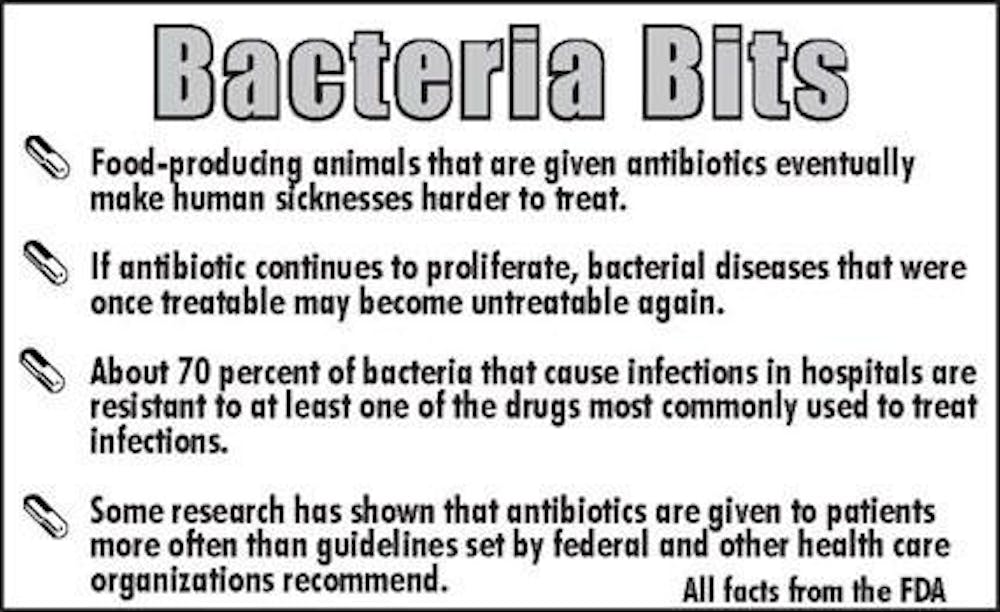Since his junior year of high school, UF sophomore Tyler Gums has been planning a way to combat the growing problem of antibiotic resistance.
Now, as president of the Pre-Pharmacy Society and after months of planning, Gums finally has the manpower and resources to put his plan into action.
However, his plan doesn't involve expensive, high-tech equipment. It doesn't even require a lab.
What it does need is a classroom full of eager fourth and fifth graders.
On Oct. 29, Gums, along with members of the Pre-Pharmacy Society, began visiting schools in Alachua County as part of an educational program called Antibiotics & You geared toward children.
While an exact date is not set, more presentations are planned for the future.
"These kids are smart," Gums said. "They know there is an issue, and they're going to be able to look out for it. We just want them to know what's going on."
The goals of the presentations are to teach elementary and middle-school students the differences between a viral and bacterial infection, explain antibiotic resistance and inform them of how to protect against infection.
"That's where the most antibiotic resistance is - in children," Gums said. "We want to let them know that we want to try and protect the future, if that is at all possible."
The packets the club will use for the presentations come from the Michigan Antibiotic Resistance Reduction Coalition, a nonprofit coalition comprised of professional and community organizations concerned with the misuse and overuse of antibiotics.
To make the information more fun for the kids, the club has prepared songs, skits, games and hands-on activities to complement the packets and slides that are shown on a projector.
A pamphlet handed out to the kids has a word search, a rhyming song and a character called the Resistance Ranger.
One activity involves popping a balloon filled with glow-in-the-dark liquid to demonstrate the germ-spreading power of a sneeze, Gums said.
"Anything that makes the principle behind the project obvious to the kids, the more hands-on, the more you can get the kids doing and interacting, the more they are going to learn about that experience," said Marilyn Waylen, a fifth-grade teacher at Brentwood Elementary School who hosted the first presentation.
Waylen, who once taught Gums when he was in elementary school, said it is rewarding to see one of her students giving back to the community and thinks Gums will inspire her students.
"It's a wonderful opportunity we have with the University of Florida," Waylen said. " The kids are just wowed by all [of it]. The idea that there are real-life things you can do with science and become something inside a field is hugely important to them."
While the club wants the kids to have fun during the presentations, the increase in antibiotic resistance is a serious problem in the medical community, Gums said.
Because bacteria are constantly evolving, pharmaceuticals have to develop new antibiotics to combat illnesses that were once easy to treat, such as a staph infection, Gums said.
Bacteria that survive antibiotics go on to reproduce more resistant bacteria, he said.
The problem is that the pharmaceuticals are not keeping up with the advancing bacteria.
Since bacteria can evolve, the antibiotics that fight them have a shelf life, Gums said.
Educating children and parents about the differences between viral and bacterial infections can help curb antibiotic resistance by helping to eliminate patient peer-pressure, Gums said.
Patient peer-pressure occurs when patients go to the doctor expecting medication, he said.
"They want to go in there and get a drug and come out because they think that is what will fix them," Gums said.
However, according to the informational packet, if a patient has a viral infection, an antibiotic will not help them because antibiotics can treat only bacterial infections.
But because the patient has taken time out of his or her day to visit the doctor and is paying for the visit, the doctor is pressured to give the patient medication without testing to see whether he or she has a bacterial infection.
Gums said he would eventually like to see the program spread to other colleges in Florida. When the club has visited all the middle and elementary schools, he said the society may begin visiting high schools as well.
"I want to impact the community and members as positively as I can," Gums said.






